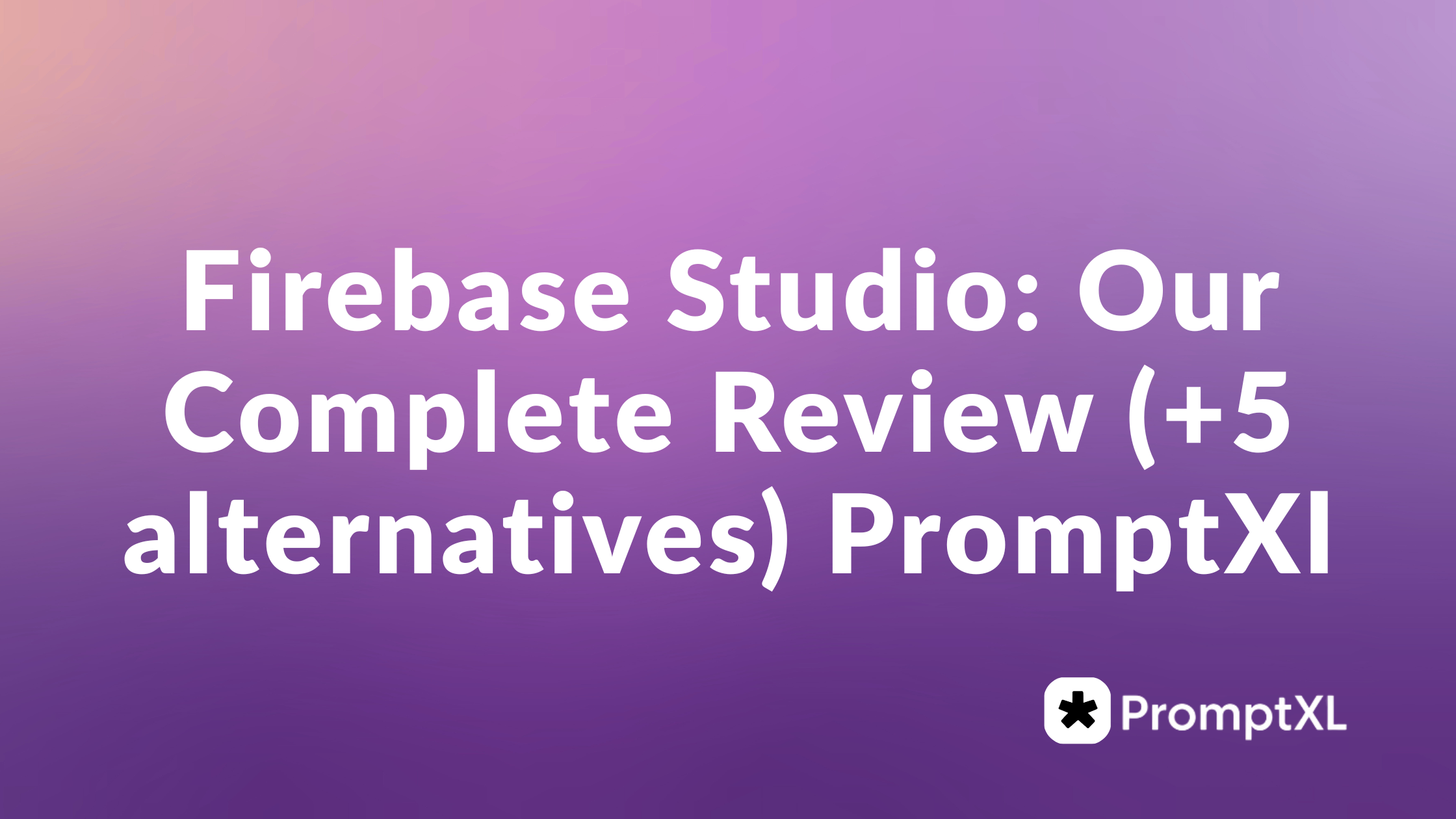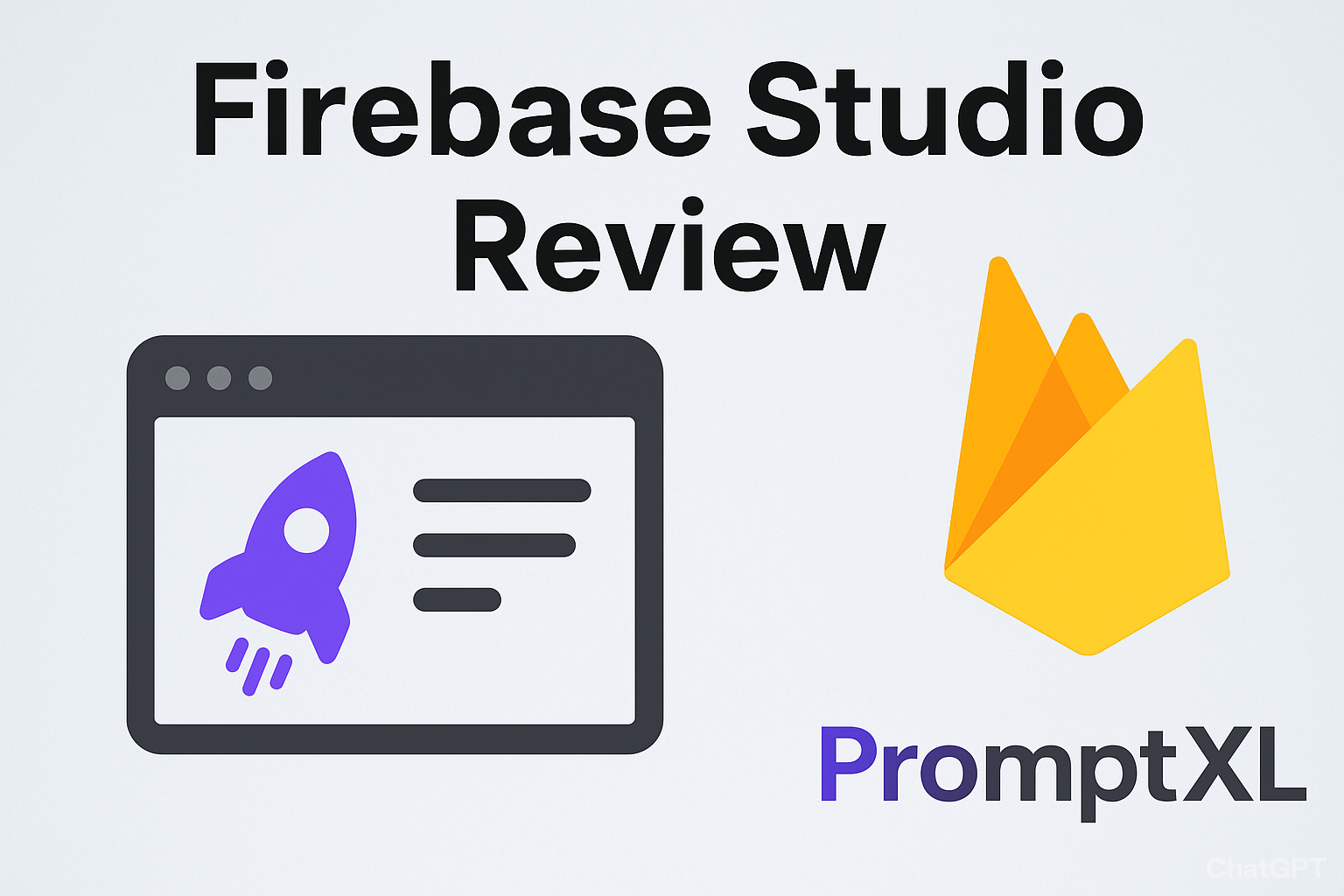
Introduction
In today’s fast-paced digital world, businesses and entrepreneurs need to move from idea to application faster than ever. Traditional software development often involves hiring business analysts, project managers, and developers to capture requirements, write test cases, and finally build a working product. This process is slow, expensive, and resource-heavy.Firebase Studio Review.
That’s where AI-powered development tools like Firebase Studio and PromptXL come in. These platforms promise to make app building faster, smarter, and more accessible to everyone — whether you’re a seasoned developer or a non-technical founder with a big idea.
In this article, we’ll deliver a comprehensive Firebase Studio Review, exploring its features, pricing, pros and cons, and usability. More importantly, we’ll show why PromptXL is the stronger alternative — empowering users to go from a raw idea to a production-ready application in minutes, simply by describing their project in natural language.

What is Firebase Studio?
Firebase Studio is a cloud-based development environment created by Google. It integrates Google Cloud’s infrastructure with Gemini AI, offering developers a streamlined way to build full-stack web and mobile apps.
Its standout capability is AI-driven prototyping: you describe your app idea using natural language, images, or sketches, and Firebase Studio generates a working prototype with code and previews.
The platform also comes preloaded with templates in multiple frameworks like React, Flutter, Next.js, and Node.js, along with deep integration into Firebase services such as Firestore, Authentication, Realtime Database, and Hosting.
For teams, Firebase Studio supports real-time collaboration, allowing developers to share their workspace via a URL. Deployment is handled through Firebase Hosting with one-click publishing.
In short, Firebase Studio is designed to remove friction in the app development lifecycle while staying tightly integrated into the Google ecosystem.
Firebase Studio Review: Features & Capabilities
Let’s dive deeper into what makes Firebase Studio unique.
AI-Driven Prototyping
One of Firebase Studio’s main features is the App Prototyping Agent, which generates working blueprints and code from text prompts, sketches, or images. This allows developers to quickly test ideas without starting from scratch.
Ready-to-Use Templates and Frameworks
Firebase Studio offers sample apps and templates in multiple languages and frameworks such as Go, Java, Node.js, React, and Flutter. This reduces setup time and accelerates prototyping.
Firebase Services Integration
As expected, Firebase Studio is tightly coupled with Firebase’s backend services. Developers can easily integrate Firestore, Authentication, Cloud Functions, and Hosting directly within the platform.
Real-Time Collaboration
Firebase Studio supports collaborative workspaces. Developers can invite teammates via a simple URL link, making it easier to co-edit, review, and deploy in real time.
Deployment Options
With one-click app deployment, Firebase Studio allows developers to push their apps live on Firebase Hosting. It supports builds, server-side rendering, and a global CDN for efficient hosting.
Firebase Studio Pricing Review
Pricing is always an important consideration when reviewing any app development platform.
Free Tier (Preview Phase)
Currently, Firebase Studio is in preview mode and offers limited free usage:
- Up to 3 workspaces per user.
- Google Developer Program members get 10 workspaces.
- Premium members can access up to 30 workspaces.
Standard and Premium Plans
- Standard Plan – Free with up to 10 workspaces.
- Premium Plan – $299/year, offering up to 30 workspaces and additional AI features.
Enterprise Plan
Custom pricing for large organizations with unlimited workspaces and advanced AI capabilities.
Additional Costs
While Firebase Studio itself might look affordable, the real costs add up with Firebase’s backend services:
- Firestore, Cloud Functions, Hosting, and Storage follow pay-as-you-go pricing.
- Exceeding free quotas incurs ongoing costs.
- Gemini API usage also introduces extra charges beyond free allowances.
For startups or small teams, this pricing structure may feel unpredictable and harder to control.
Firebase Studio Review: Pros and Cons
Like every tool, Firebase Studio has strengths and weaknesses.
Pros
- AI-powered prototyping accelerates app development.
- Tight integration with Firebase services for backend and hosting.
- Real-time collaboration for distributed teams.
- Prebuilt templates reduce setup time.
- One-click deployment simplifies going live.
Cons
- Learning curve for mastering advanced AI features.
- Heavy dependence on Google Cloud ecosystem, limiting flexibility.
- Hidden costs when scaling apps beyond the free tier.
- Limited customization in AI-generated prototypes.
PromptXL vs Firebase Studio: The Better Alternative
While Firebase Studio is impressive, it has clear limitations — particularly around costs, ecosystem lock-in, and customization. That’s where PromptXL shines as a next-generation alternative.
What is PromptXL?
PromptXL is an AI-powered app builder that takes you from a raw idea to a production-ready application in minutes. Unlike Firebase Studio, which focuses heavily on templates and Google Cloud, PromptXL removes the need for business analysts, developers, or project managers to translate requirements.
With PromptXL, you simply describe your app in natural language, and the platform generates:
- Requirements documentation
- Test cases
- A fully functional app prototype
- A production-ready version
Key Differences: PromptXL vs Firebase Studio
- No vendor lock-in – PromptXL supports flexible deployment options beyond just Firebase Hosting.
- Faster idea-to-app transition – PromptXL handles planning, documentation, and testing, not just prototyping.
- Simpler pricing – Transparent pricing without unpredictable add-ons.
- Beginner-friendly – Designed for entrepreneurs, product owners, and teams, not just developers.
In short, while Firebase Studio requires you to still manage backend services and potential hidden costs, PromptXL eliminates complexity and puts the entire app lifecycle in your hands with one platform.
5 Alternatives to Firebase Studio (and Why PromptXL Leads the Pack)
If you’re researching Firebase Studio, you’re probably also exploring alternatives. Here are the top five.
1. PromptXL (Best Overall Alternative)
- AI-powered full-stack app builder
- Converts raw ideas into production-ready apps
- Handles requirements, test cases, and deployment
- Beginner-friendly with no steep learning curve
2. Capacity.so
- Strong backend features with rollback and auto-healing.
- Uses advanced AI models beyond Gemini.
- Best for developers who want stability-focused solutions.
3. Lovable
- Simple, intuitive builder for non-technical users.
- Great for quick prototypes without coding.
- Lacks deeper backend integration compared to PromptXL.
4. Replit
- Cloud-based coding IDE.
- Strong real-time collaboration.
- Ideal for developers who want flexibility with coding but less AI automation.
5. v0 / Polymet.ai
- Token-based pricing model.
- Supports advanced AI-driven debugging and testing.
- Better suited for developers comfortable managing infrastructure.
How to Choose Between PromptXL and Firebase Studio
When deciding which platform fits your needs, consider these factors:
Coding Expertise
- PromptXL: Perfect for non-technical founders or small teams who want speed and simplicity.
- Firebase Studio: Best for developers already familiar with Firebase and Google Cloud.
Project Complexity
- PromptXL: Handles both planning and execution, making it ideal for complete product lifecycles.
- Firebase Studio: Better for rapid prototyping inside Google’s ecosystem.
Cost Efficiency
- PromptXL: Transparent pricing without unexpected backend charges.
- Firebase Studio: Costs can spike as Firebase services scale.
Collaboration and Scalability
- Both platforms support real-time collaboration.
- PromptXL edges ahead with simpler onboarding for non-technical team members.
Conclusion
Our Firebase Studio Review highlights that while it’s an exciting new tool from Google, it comes with caveats: a steep learning curve for advanced features, tight coupling with Google Cloud, and unpredictable costs once you scale.
That’s where PromptXL changes the game. It eliminates the need for multiple roles, simplifies the entire app development lifecycle, and empowers teams to focus on ideas instead of infrastructure.
If you’re evaluating Firebase Studio or its alternatives, give PromptXL a serious look. It’s the fastest way to turn your app concept into reality — without the complexity, hidden costs, or vendor lock-in.
FAQ
What are the key features of Firebase Studio that accelerate app development?
- AI-driven prototyping
- Gemini AI for debugging and refactoring
- Prebuilt templates for popular frameworks
- Firebase service integration (Firestore, Auth, Hosting)
- Real-time collaboration
- One-click deployment
How does Firebase Studio use AI agents?
Firebase Studio uses its App Prototyping Agent with multimodal input (text, images, sketches) to generate app blueprints, code, and previews. Gemini APIs assist with debugging and AI workflows.
What deployment options does Firebase Studio offer?
- Firebase Hosting (static and dynamic apps)
- Firebase App Hosting (for Next.js, Angular, etc.)
- Cloud Run (containerized apps)
- Third-party integrations
Can I import existing projects into Firebase Studio?
Yes. Firebase Studio supports imports from GitHub, GitLab, Bitbucket, or local machines.
Why choose PromptXL over Firebase Studio?
Because PromptXL goes beyond prototyping — it builds, tests, documents, and deploys complete apps directly from natural language prompts, without hidden costs or Google Cloud lock-in.
Related Topic:Reduce Technical Debt: The Complete Success Playbook with PromptXL

